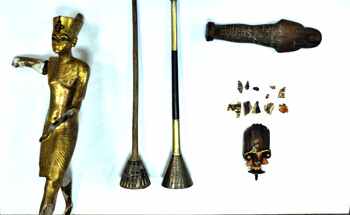'Missing' Treasures Returned to Egyptian Museum

Get the world’s most fascinating discoveries delivered straight to your inbox.
You are now subscribed
Your newsletter sign-up was successful
Want to add more newsletters?

Delivered Daily
Daily Newsletter
Sign up for the latest discoveries, groundbreaking research and fascinating breakthroughs that impact you and the wider world direct to your inbox.

Once a week
Life's Little Mysteries
Feed your curiosity with an exclusive mystery every week, solved with science and delivered direct to your inbox before it's seen anywhere else.

Once a week
How It Works
Sign up to our free science & technology newsletter for your weekly fix of fascinating articles, quick quizzes, amazing images, and more

Delivered daily
Space.com Newsletter
Breaking space news, the latest updates on rocket launches, skywatching events and more!

Once a month
Watch This Space
Sign up to our monthly entertainment newsletter to keep up with all our coverage of the latest sci-fi and space movies, tv shows, games and books.

Once a week
Night Sky This Week
Discover this week's must-see night sky events, moon phases, and stunning astrophotos. Sign up for our skywatching newsletter and explore the universe with us!
Join the club
Get full access to premium articles, exclusive features and a growing list of member rewards.
Four objects missing from the Egyptian Museum since the January Revolution have been returned, according to Zahi Hawass, secretary general of the Supreme Council of Antiquities, on his blog today.
The missing items had been stolen during protests on the streets of Cairo. Some protests outside the Egyptian Museum in Cairo February actually centered around Hawass' handling of a Jan. 28 museum break-in. Hawass originally said that no artifacts had been stolen, only later to announce that 18 items, including some belonging to King Tutankhamen, were missing.
That included the gilded wooden statue of Tutankhamun standing in a boat throwing a harpoon, which was one of the four returned objects. The statue suffered slight damage, Hawass wrote, with a small part of the crown and pieces of the legs missing. The figure will be restored and reunited with its boat, which is still in the museum.
The second returned object is one of the 10 missing funerary figurines (called shabtis) of Yuya and Tjuya (parents of the great Queen Tiye and great-grandparents of Tutankhamun). The figures are in good condition, and will be on display again immediately, according to Tarek El-Awady, director of the Egyptian Museum.
The other two objects included: a gilded bronze and wooden trumpet of Tutankhamun, which was in excellent condition, Hawass said; and part of King Tut's fan. Part of the royal fan is still missing.
Get the world’s most fascinating discoveries delivered straight to your inbox.
Jeanna Bryner is managing editor of Scientific American. Previously she was editor in chief of Live Science and, prior to that, an editor at Scholastic's Science World magazine. Bryner has an English degree from Salisbury University, a master's degree in biogeochemistry and environmental sciences from the University of Maryland and a graduate science journalism degree from New York University. She has worked as a biologist in Florida, where she monitored wetlands and did field surveys for endangered species, including the gorgeous Florida Scrub Jay. She also received an ocean sciences journalism fellowship from the Woods Hole Oceanographic Institution. She is a firm believer that science is for everyone and that just about everything can be viewed through the lens of science.
 Live Science Plus
Live Science Plus










